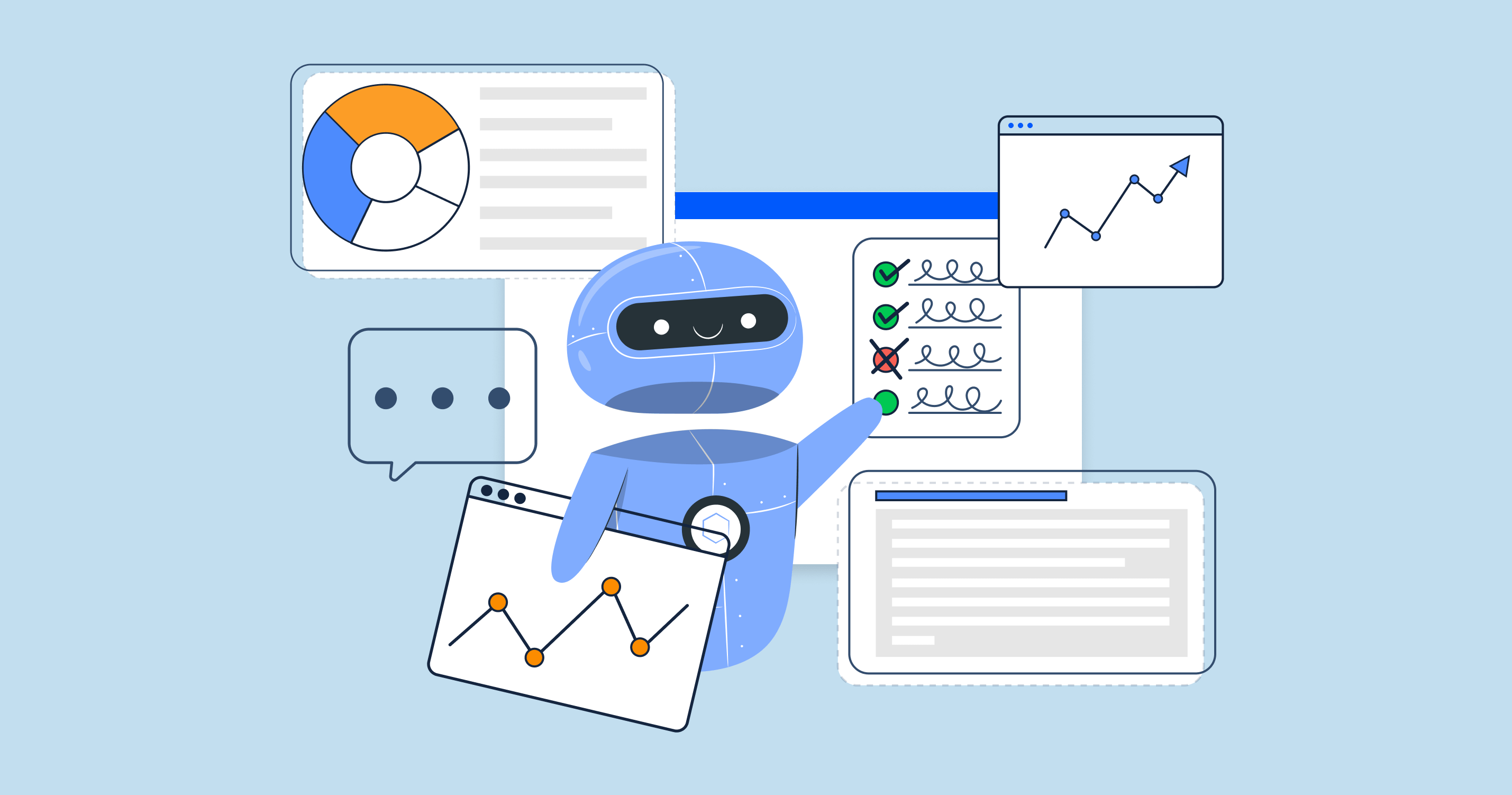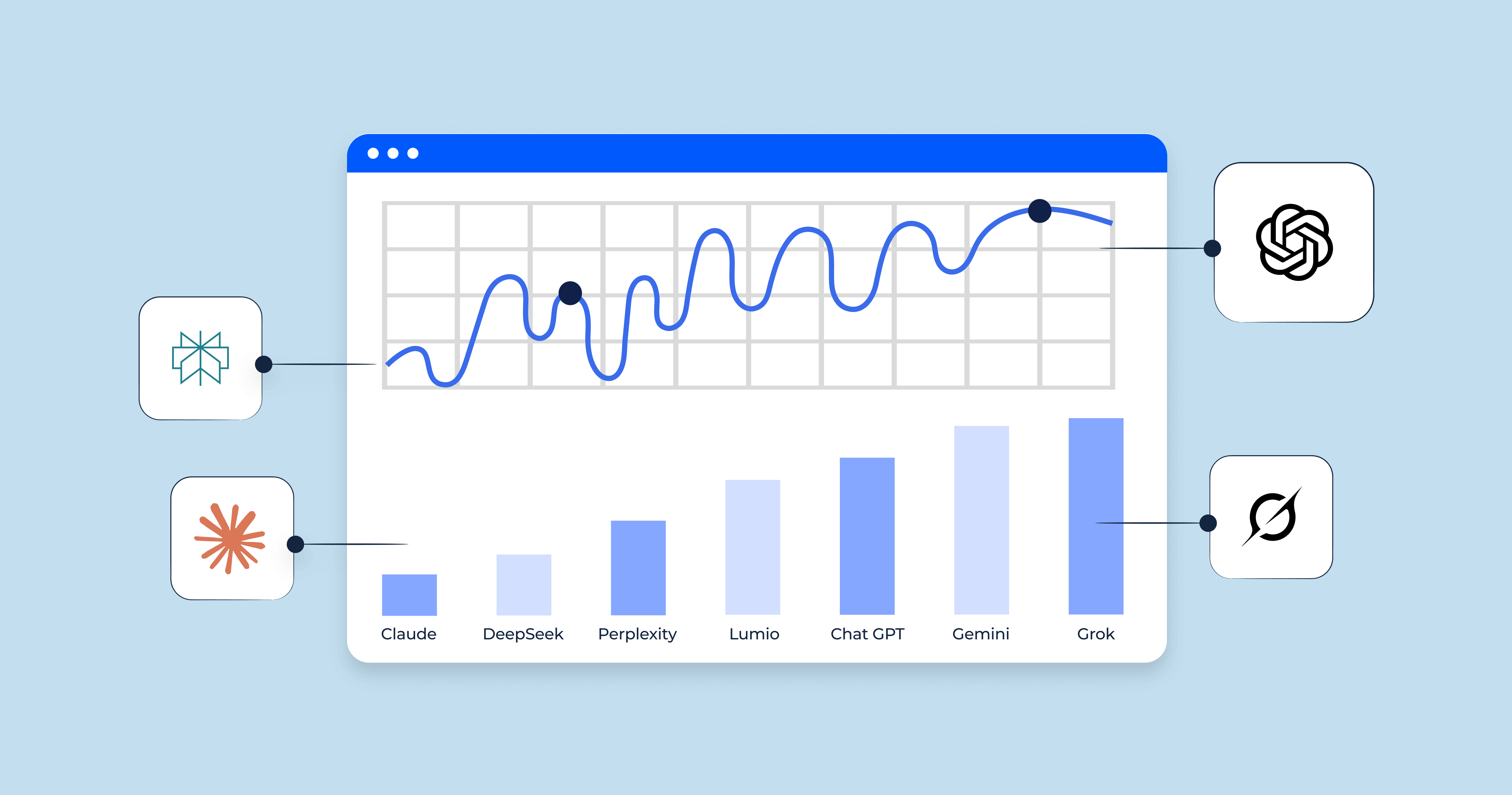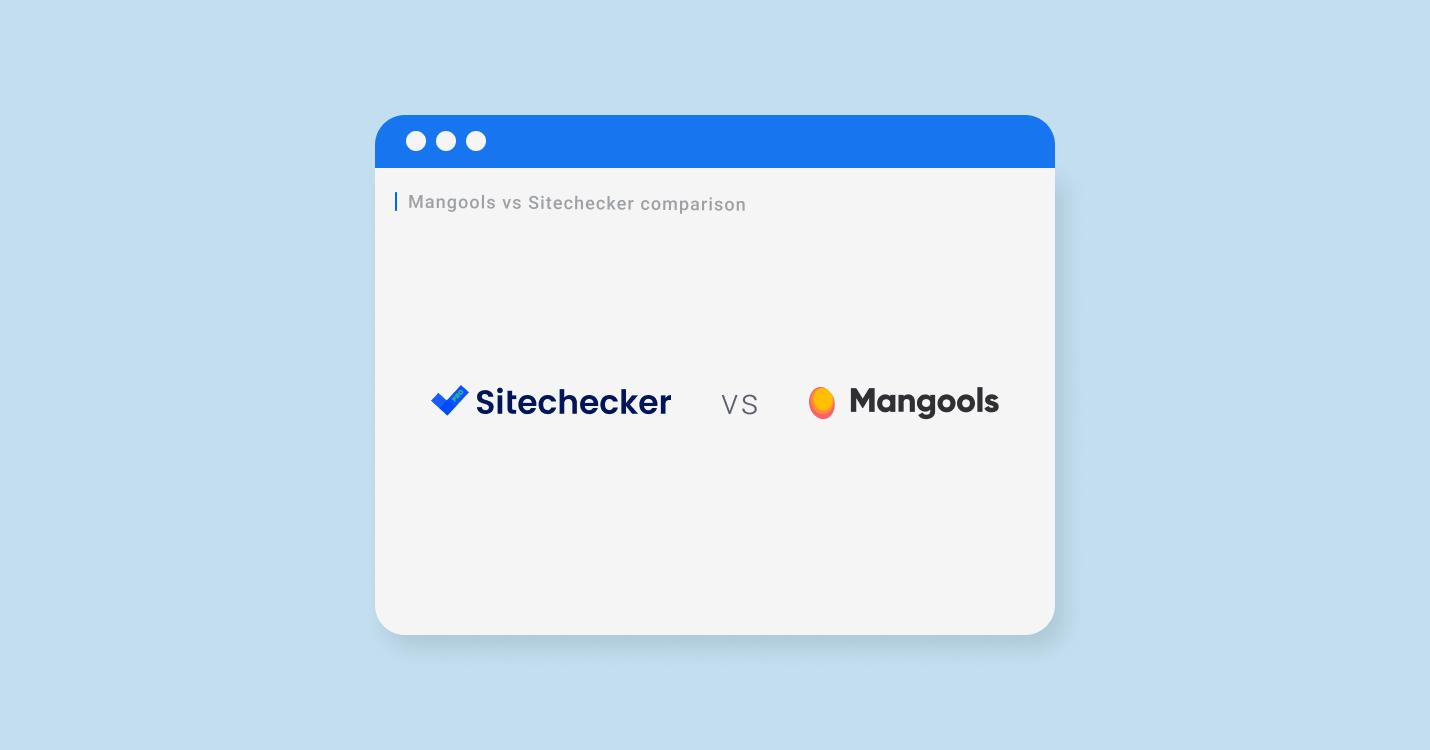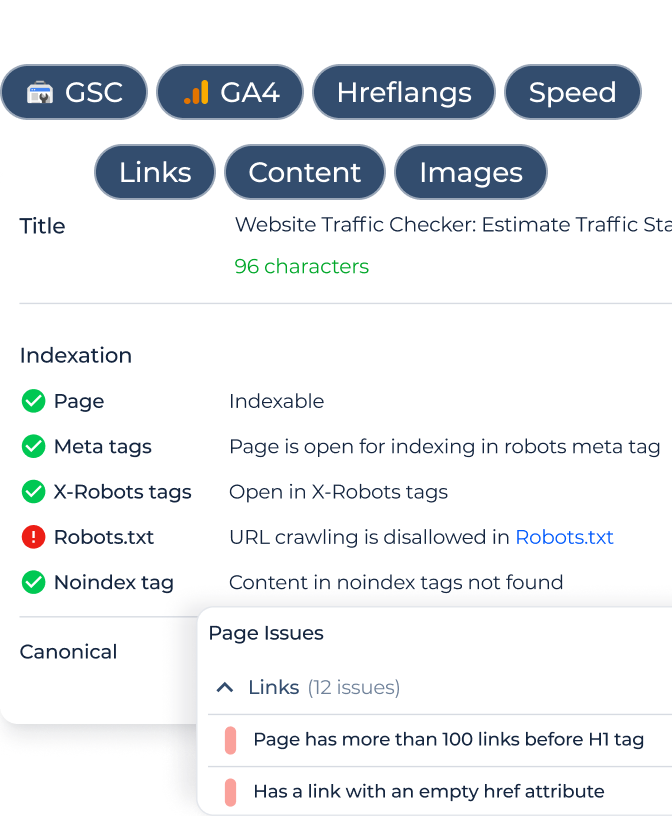What is the tool for SEO client management?
A tool for SEO reports helps organize, monitor, and report on client campaigns. It replaces scattered spreadsheets and disconnected platforms by bringing essential workflows – such as website monitoring, rank tracking, and reporting – into one place.
This makes performance tracking more efficient, improves transparency, and simplifies client communication.
Key functions of SEO client management tools
- Monitor websites – identify technical SEO issues, indexability problems, speed, and errors.
- Send alerts and notifications – instantly inform about critical SEO changes.
- Track keywords and rankings – measure how websites perform in search results over time.
- Generate reports and dashboards – create automated, white-label reports with client branding.
- Integrate with other tools – connect to Google Search Console, Google Analytics, and more.
- Enable multi-user access – let teams and clients collaborate in one shared space.
Next, we’ll explore the 5 top tools every SEO agency should consider to streamline client management and deliver exceptional results.
Best SEO tools for client management: feature comparison
| Feature/Tool | Sitechecker | Ahrefs | SE Ranking | Semrush | AgencyAnalytics |
|---|---|---|---|---|---|
| White-label dashboards & reports | ✅ Full | ⚠️ Limited | ✅ Yes | ⚠️ Limited | ✅ Yes |
| Multi-user access | ✅ Unlimited | ⚠️ Extra cost | ⚠️ Extra cost | ⚠️ Extra cost | ✅ Yes |
| Site audit | ✅ Yes | ✅ Yes | ✅ Yes | ✅ Yes | ❌ No(focus on reporting) |
| Rank tracking | ✅ Yes | ✅ Yes | ✅ Yes | ✅ Yes | ✅ Yes |
| Backlink monitoring | ❌ No | ✅ Yes | ⚠️ Limited | ✅ Yes | ✅ Yes |
| GSC & GA4 integrations | ✅ Direct sync | ✅ Yes | ✅ Yes | ✅ Yes | ⚠️ Limited |
| Real-time alerts | ✅ Instant | ⚠️ Limited | ⚠️ Limited | ❌ No | ⚠️ Limited |
| Website monitoring | ✅ Yes | ❌ No | ⚠️ Limited | ⚠️ Limited | ❌ No(agency focus, but integrates) |
| Pricing flexibility | ✅ Monthly, no enterprise contracts | ❌ Expensive | ✅ Affordable | ❌ Expensive | ⚠️ Limited |
Sitechecker combines website monitoring, alerts, rank tracking, audits, integrations, multi-user access, and white-label dashboards in one platform. It reduces manual work, ensures transparency, and simplifies client SEO campaign management while helping agencies scale with flexible pricing and automated workflows.
1. Sitechecker is the best seo client management software
Here is why:
Website monitoring & real-time alerts
Sitechecker monitors every change on your site in real time – from new pages and title edits to missing alt text or fixed issues – and logs them in a clear timeline. Filter updates by content changes, site audit issues, or page segments, compare old vs. new content, and connect changes to GSC metrics to see the impact on clicks, impressions, and rankings.
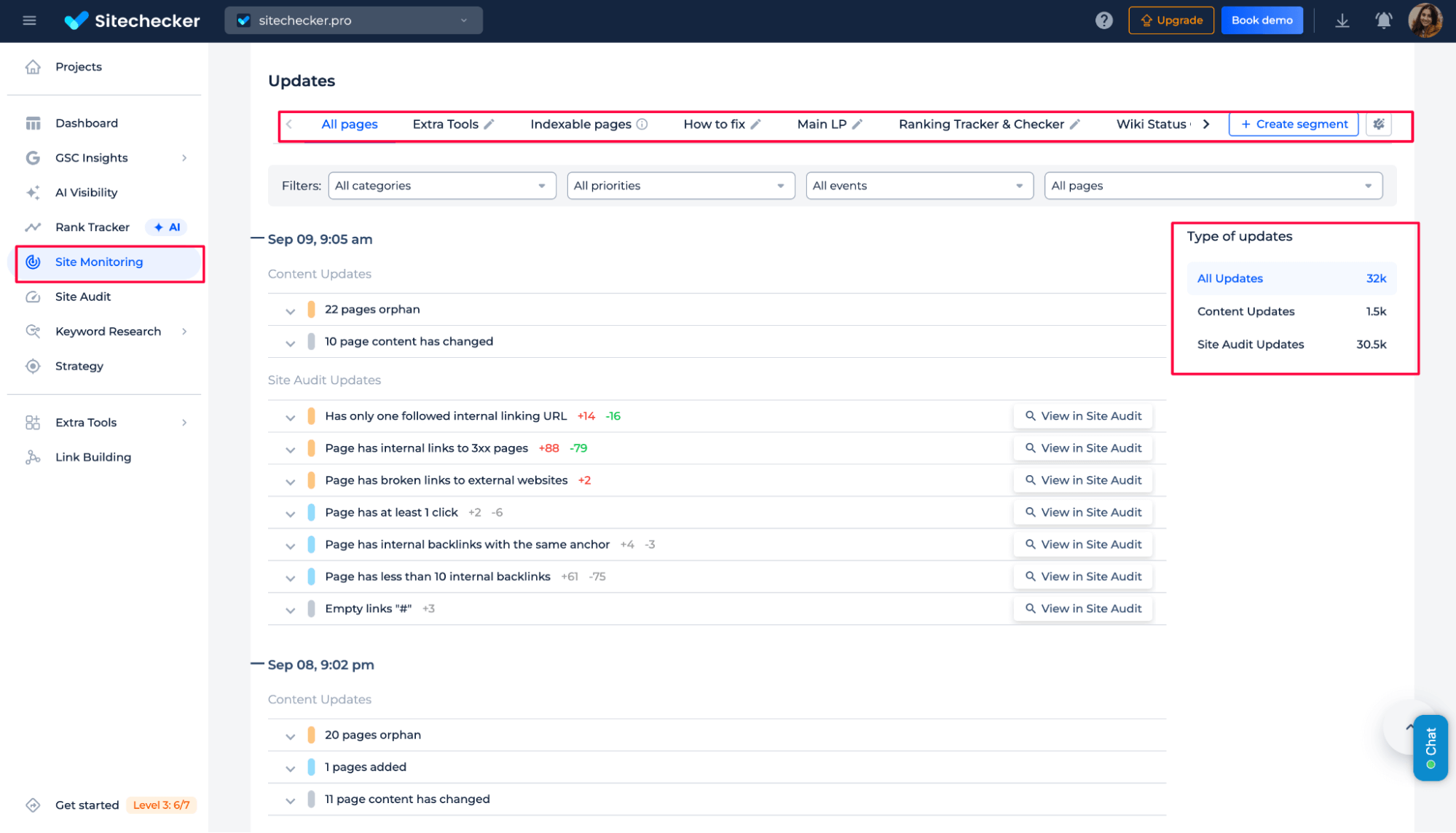
Real-time alerts notify you via email or Slack about critical events (downtime, SSL expiry, indexability/redirect/robots changes, tracking code removal), audit updates and ranking insights.
You can choose what to monitor and receive daily/weekly/monthly summaries, enabling faster troubleshooting, proactive communication, and clear proof of work for clients.
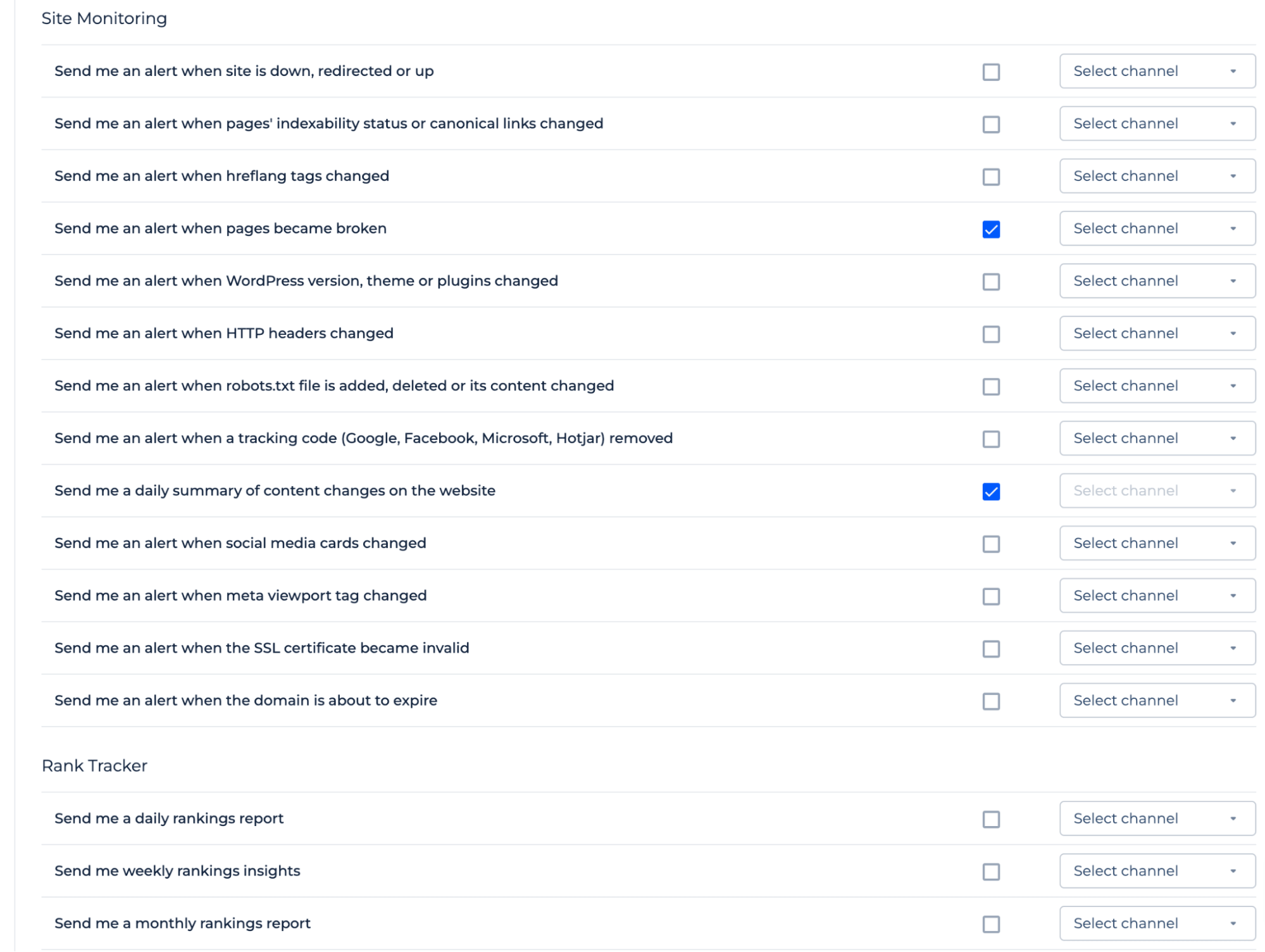
SEO white-label dashboard & reports
Sitechecker provides a single SEO Dashboard where agencies can monitor all key metrics – traffic, rankings, visibility, indexed pages, and site health – in one place. Data from GSC and GA4 is visualized with clear charts, making it easy to track performance trends and explain progress to clients.
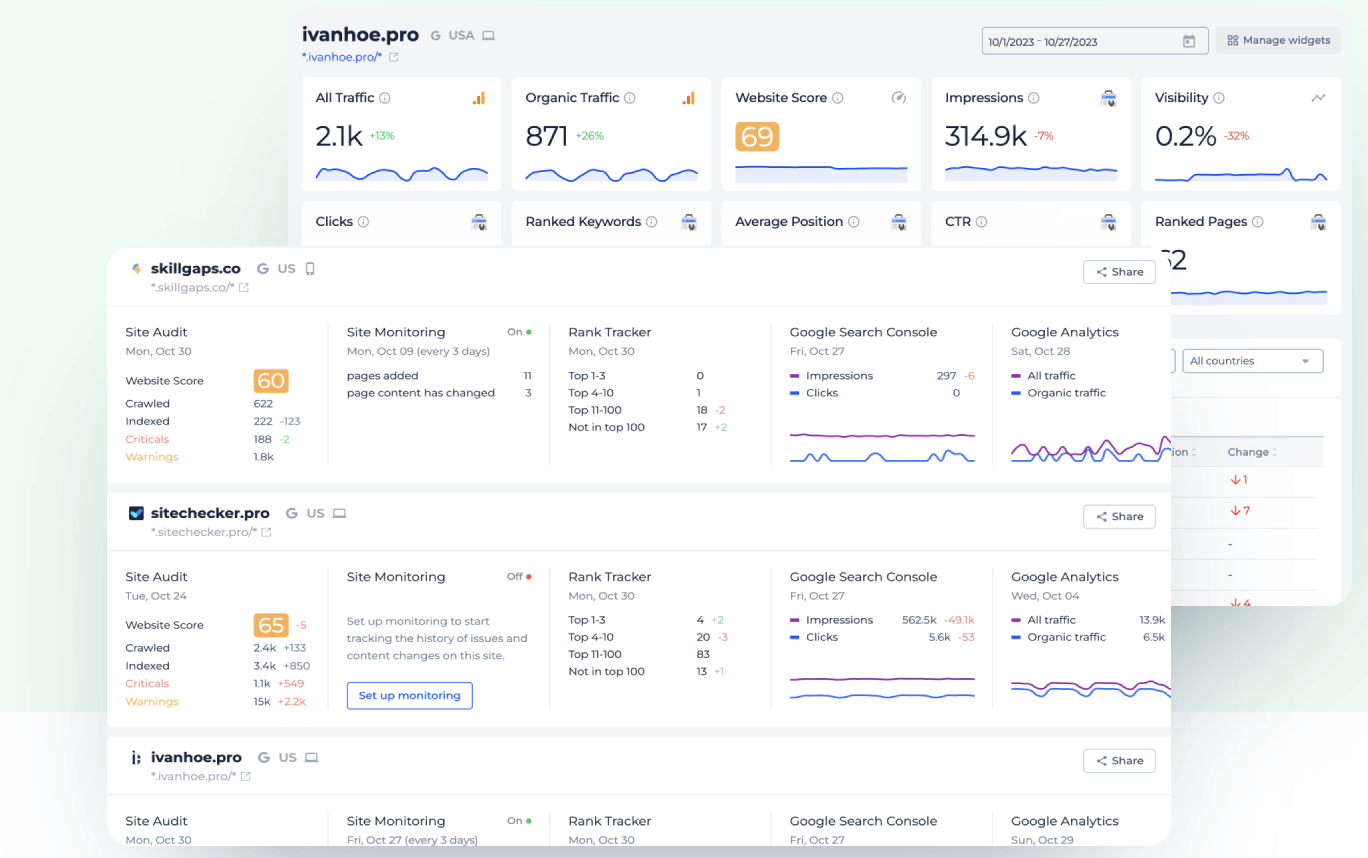
With white-label branding, dashboards and reports can be fully customized with your logo, colors, and domain, turning Sitechecker into a client-facing platform. Reports are automated and delivered in PDF, CSV, or Google Sheets, and they can be scheduled daily, weekly, or monthly.
Website audit tool powered by GSC and GA4 data
Site Audit comprehensively checks 300+ SEO issues, including indexability, links, redirects, content, speed, and mobile usability. All problems are prioritized by impact and explained in plain language with clear “how to fix” tips, making audits useful for both technical teams and non-technical clients.
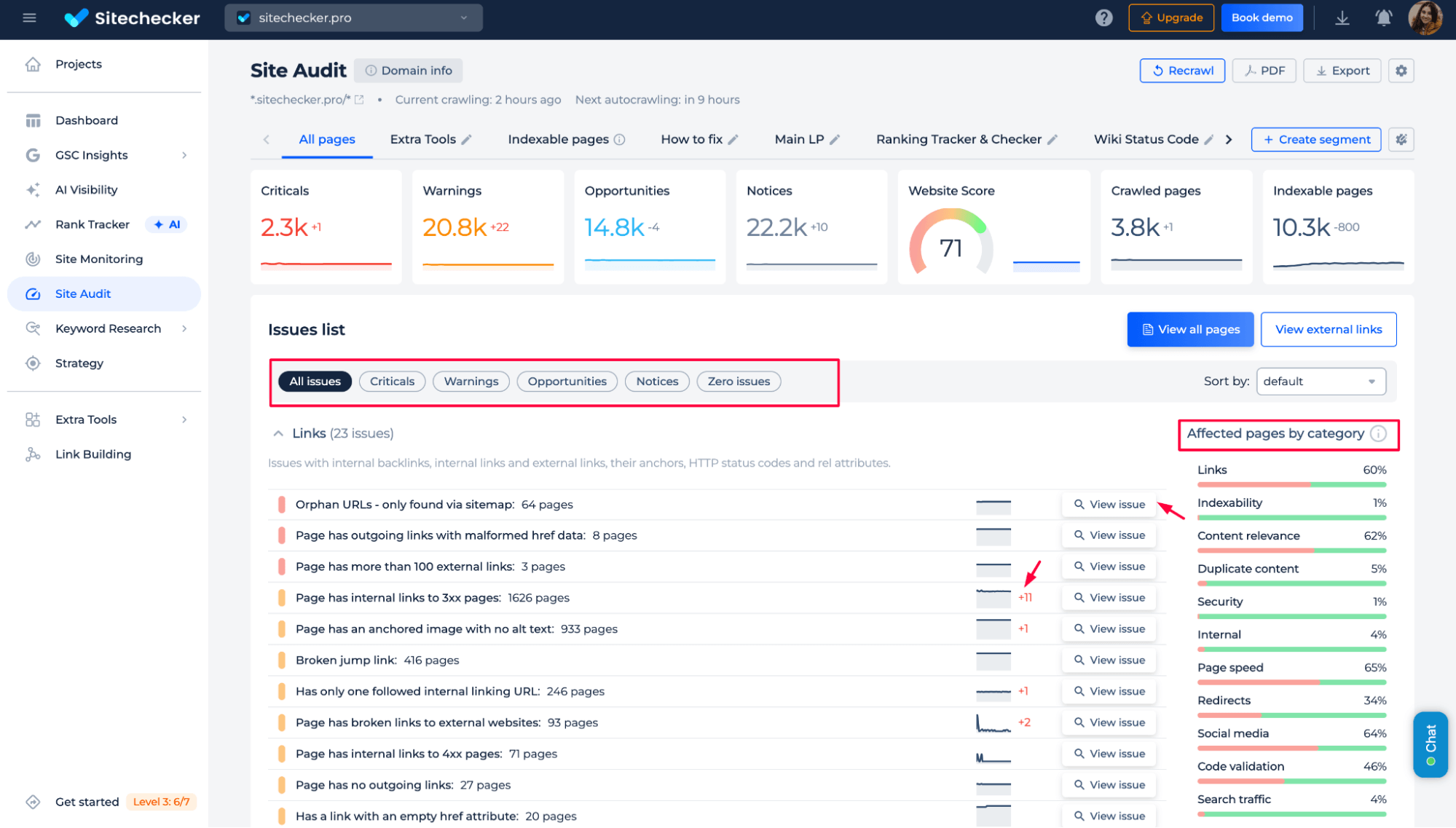
With custom crawl rules and GSC & GA4 data integration, you can focus audits on specific site sections and link fixes directly to clicks, impressions, and rankings. Automated schedules, alerts, and white-label reports ensure clients see continuous data-based improvements.
Rank Tracker tool
The Rank Tracker monitors keyword positions across countries, cities, and devices, helping agencies prove SEO progress to clients. It tracks daily changes in rankings, visibility(including AI visibility tracker), and SERP features, with clear charts that make trends easy to explain. With the AI Overview Tracker, you can see when your brand appears in Google’s AI Overviews and track which competitors are featured there.
TOP 5 LLM Rank Trackers
GSC & GA4 integrations
Sitechecker connects directly to Google Search Console and GA4, so all key SEO and traffic metrics appear in one dashboard. You can track clicks, impressions, CTR, positions, traffic, and conversions without switching tools.
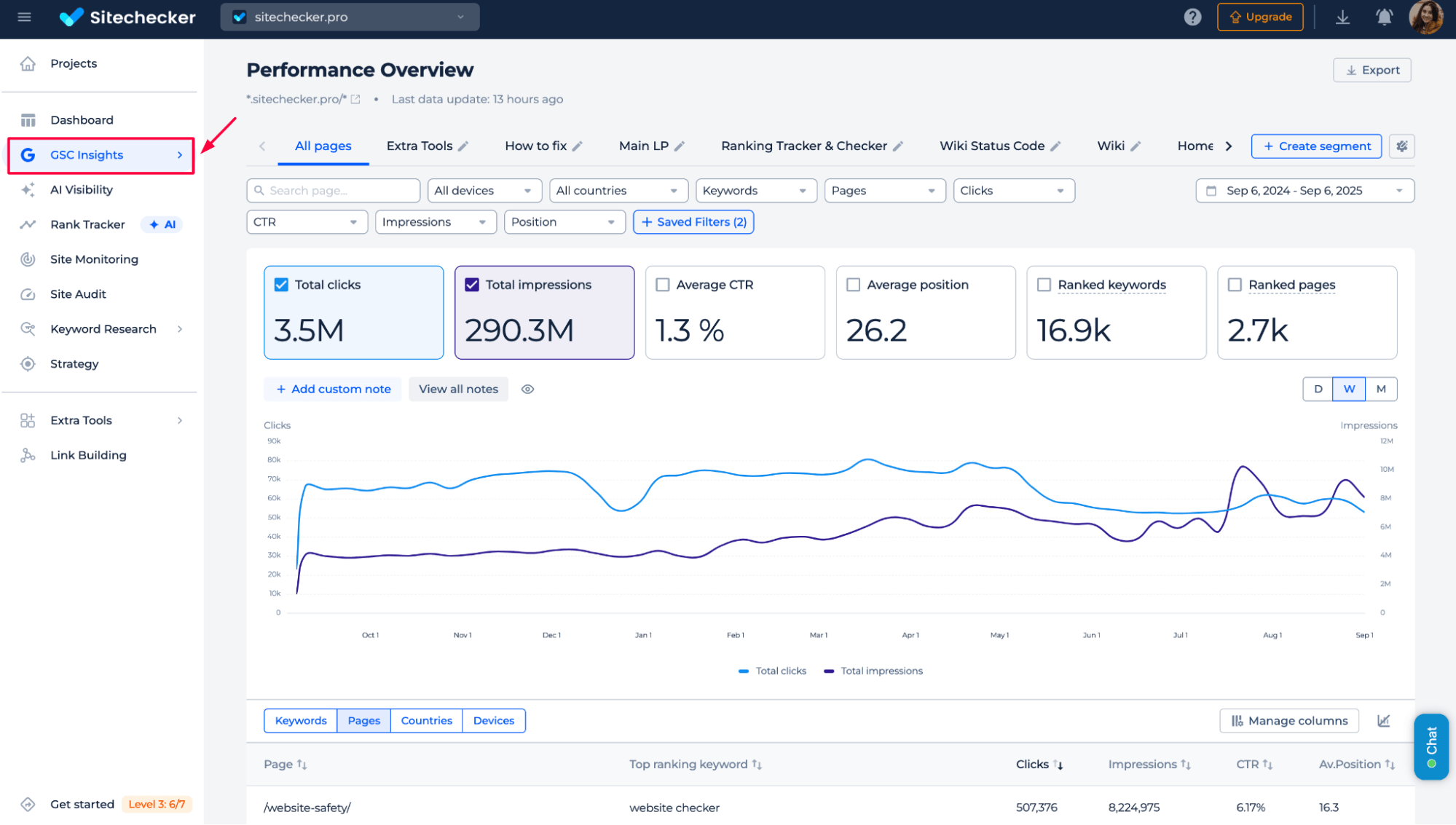
Multi-user access
With just a few clicks, multi-user access in Sitechecker lets you invite clients, teammates, or stakeholders to specific projects. This makes collaboration seamless for agencies managing multiple projects: account managers can track progress, SEO specialists can work on issues, and clients can monitor results in real time without confusion or extra reporting.
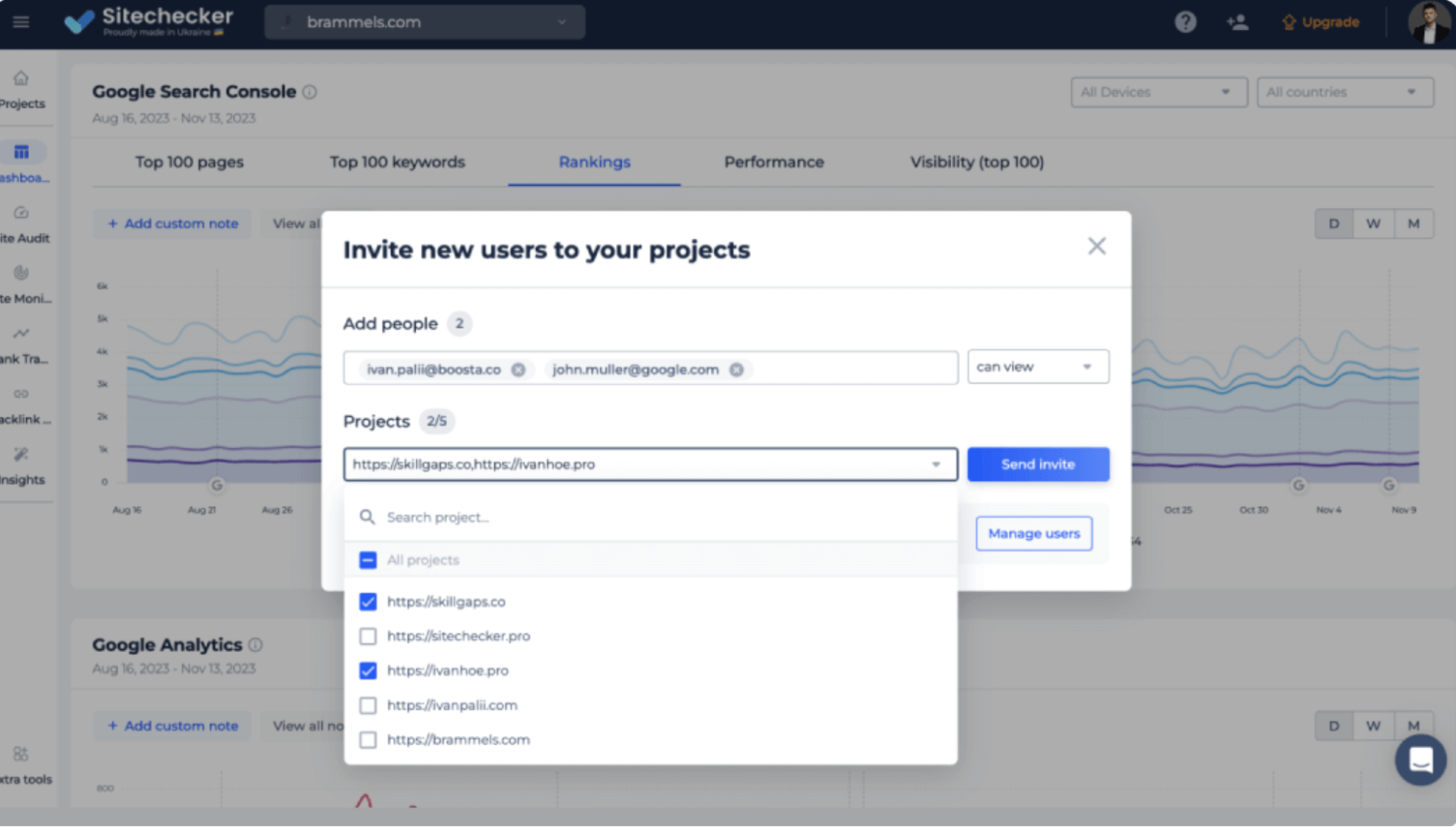
Sitechecker combines website monitoring, alerts, rank tracking, audits, integrations, multi-user access, and white-label dashboards in one platform. It reduces manual work, ensures transparency, and simplifies client SEO campaign management while helping agencies scale with flexible pricing and automated workflows.
2. Ahrefs
Ahrefs is a powerful tool for competitor research, backlink analysis, and keyword discovery. With one of the largest backlink databases on the market, it’s ideal for analyzing competitors’ link strategies and uncovering new opportunities.
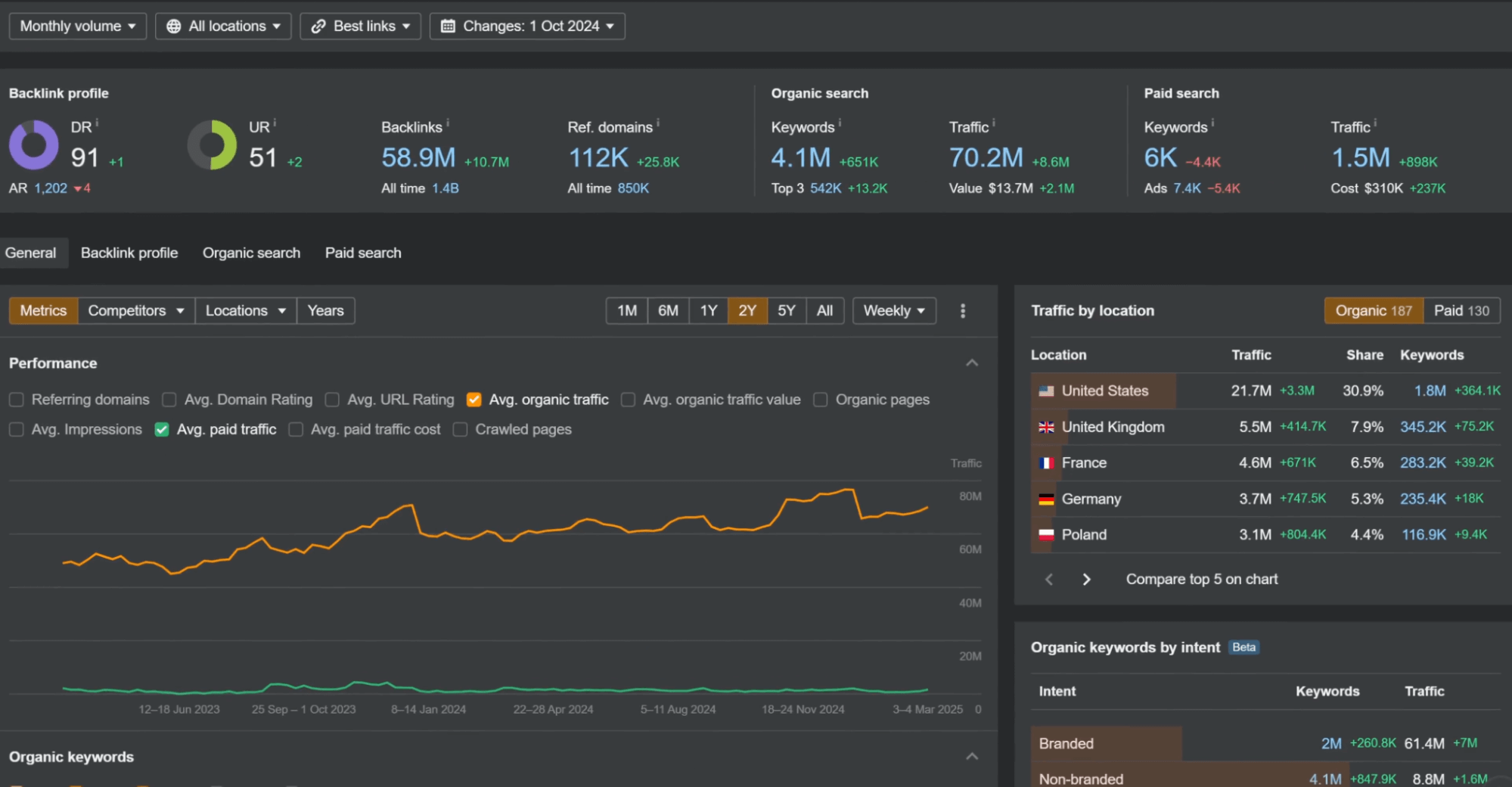
However, while strong in research, Ahrefs lacks key client management features such as white-label dashboards, multi-user access, and real-time monitoring. Agencies often need additional tools to cover these gaps.
Key advantages and drawbacks
Pros:
✅ Industry-leading backlink database with detailed link metrics.
✅ Strong competitor research tools for traffic, keywords, and content gaps.
✅ Great for analyzing market opportunities and link-building strategies.
Cons:
❌ No white-label dashboards or client-ready reports.
❌ No real-time alerts or continuous website monitoring.
❌ Lacks multi-user access for team and client collaboration.
In summary, Ahrefs is excellent for research and competitor analysis but lacks the client management features agencies need for day-to-day workflows.
3. SE Ranking
SE Ranking is an affordable all-in-one SEO platform popular among small to mid-sized agencies. It offers solid tools for rank tracking, keyword research, and site auditing, along with white-label reporting that makes it easier to share results with clients. Its lower pricing than Ahrefs or Semrush makes it attractive for agencies that want reliable features without high costs.
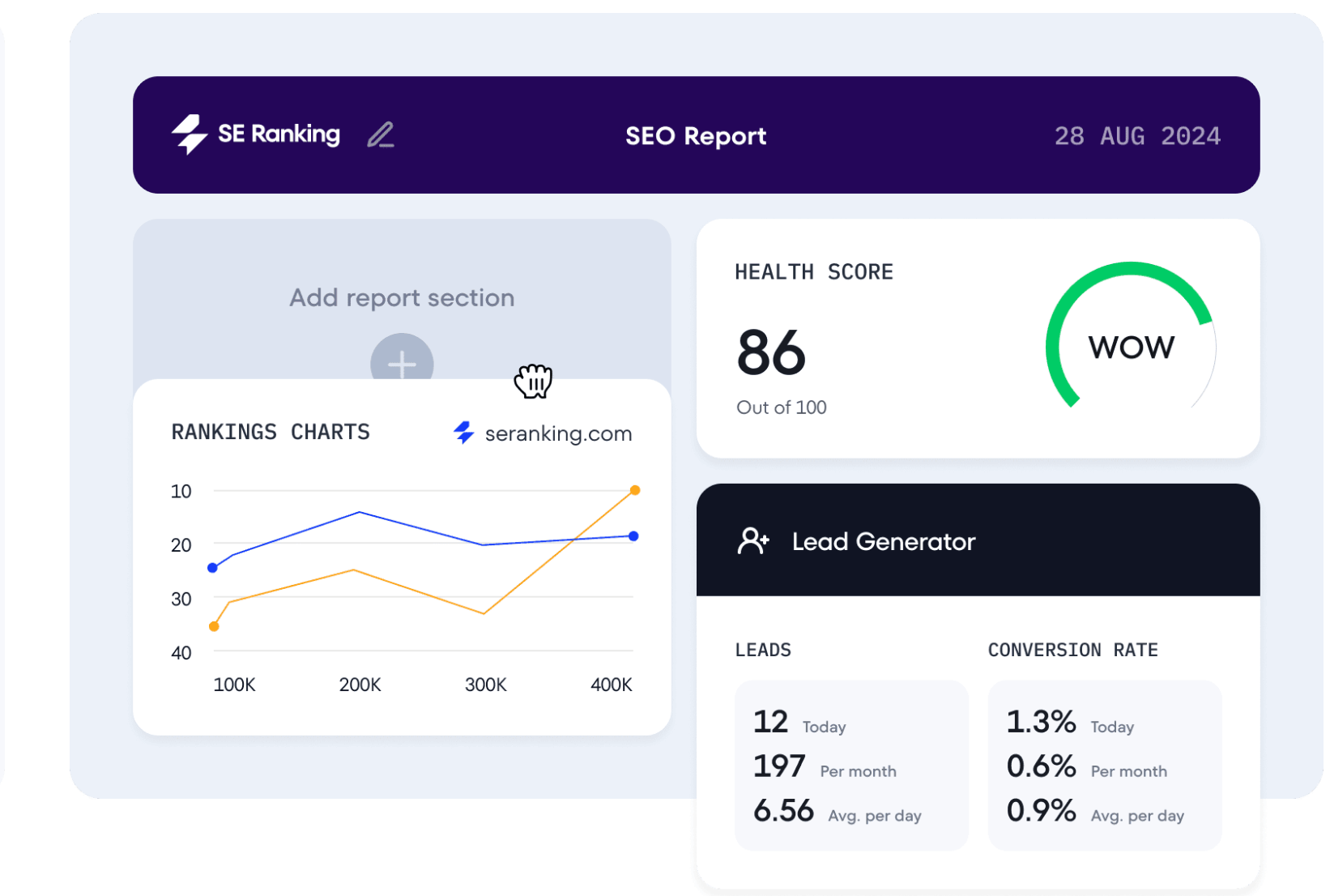
However, while SE Ranking covers most essentials, it can feel less robust for large-scale projects. Advanced features like deep website monitoring or highly detailed competitor analysis are more limited, and the platform may not scale as well for enterprise-level needs.
Key advantages and drawbacks
Pros:
✅ Affordable pricing plans suitable for SMBs and agencies.
✅ White-label dashboards and automated client reporting.
✅ Solid keyword tracking and research tools.
Cons:
❌ Limited scalability for extensive websites or enterprise projects.
❌ Fewer advanced monitoring options than Sitechecker.
❌ Some reports can lack the depth expected by bigger agencies.
In summary, SE Ranking is a cost-effective solution for SMBs and smaller agencies, but it lacks the advanced monitoring and scalability required by larger projects.
4. Semrush
Semrush is an all-in-one marketing suite that covers SEO, PPC, content, and social media. It offers strong tools for keyword research, competitor analysis, site audits, and rank tracking, making it a versatile choice for larger teams and companies running multi-channel campaigns.
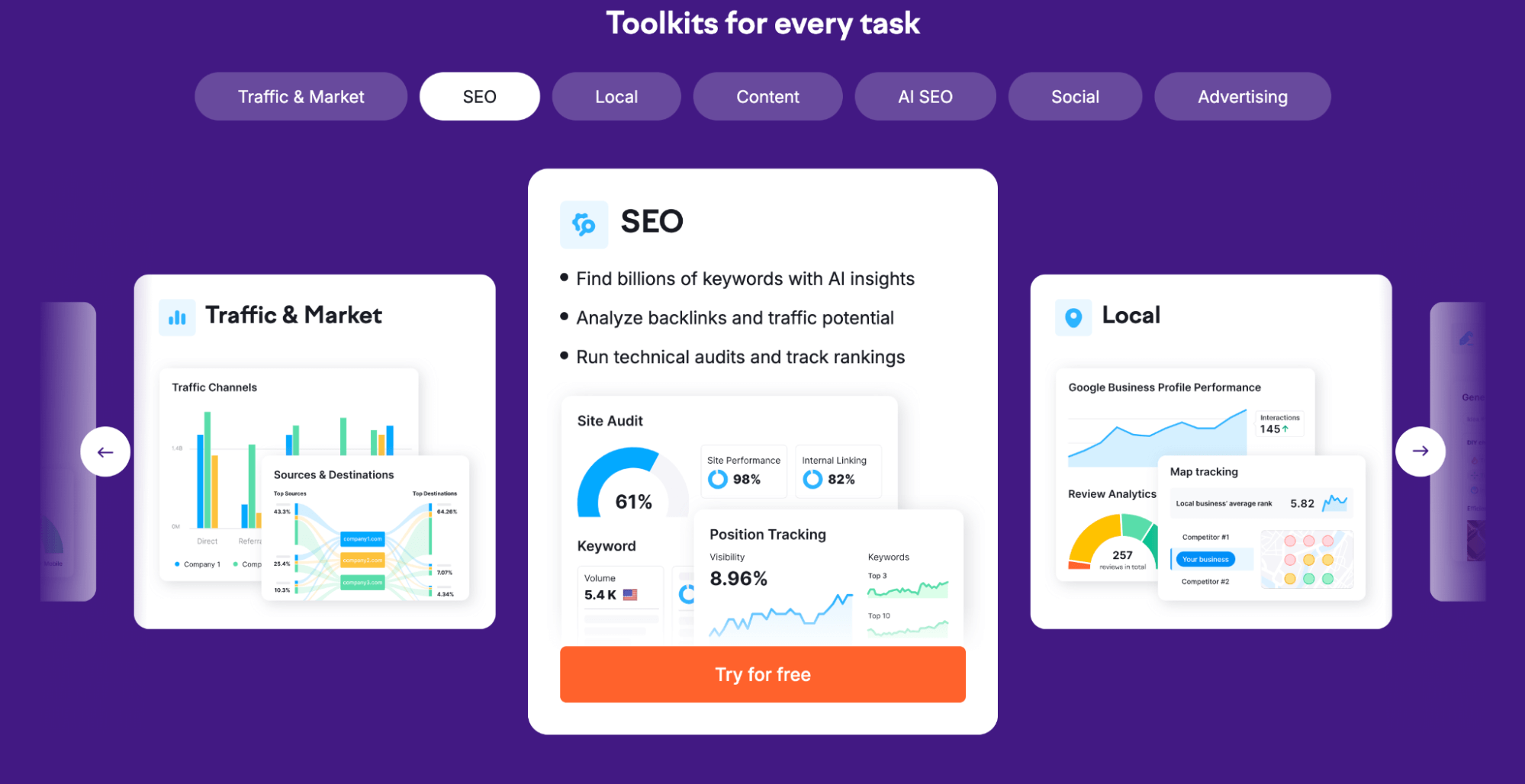
The downside is its high cost and added fees for many features. While Semrush is powerful for research and multi-channel marketing, it lacks client management essentials such as easy white-label dashboards, affordable multi-user access, and real-time monitoring. The platform is also more complex and more challenging for beginners to master.
Key advantages and drawbacks
Pros:
✅ Wide toolset covering SEO, PPC, content, and social media.
✅ Strong keyword research and competitor analysis.
✅ Reliable site audit and rank tracking.
Cons:
❌ Expensive, with many add-ons.
❌ No simple white-label dashboards for clients.
❌ Multi-user access costs extra.
In summary, Semrush is a powerful all-in-one platform for large teams, but its high cost and lack of client-friendly features make it less practical for agencies focused on streamlined SEO management.
5. AgencyAnalytics
AgencyAnalytics is a reporting platform built specifically for agencies managing multiple clients. It centralizes SEO, PPC, and social media data into customizable white-label dashboards and automated reports. With 70+ integrations, agencies can connect tools like Google Analytics, GSC, Ads, Facebook, and more, then deliver branded reports directly to clients without extra manual work.
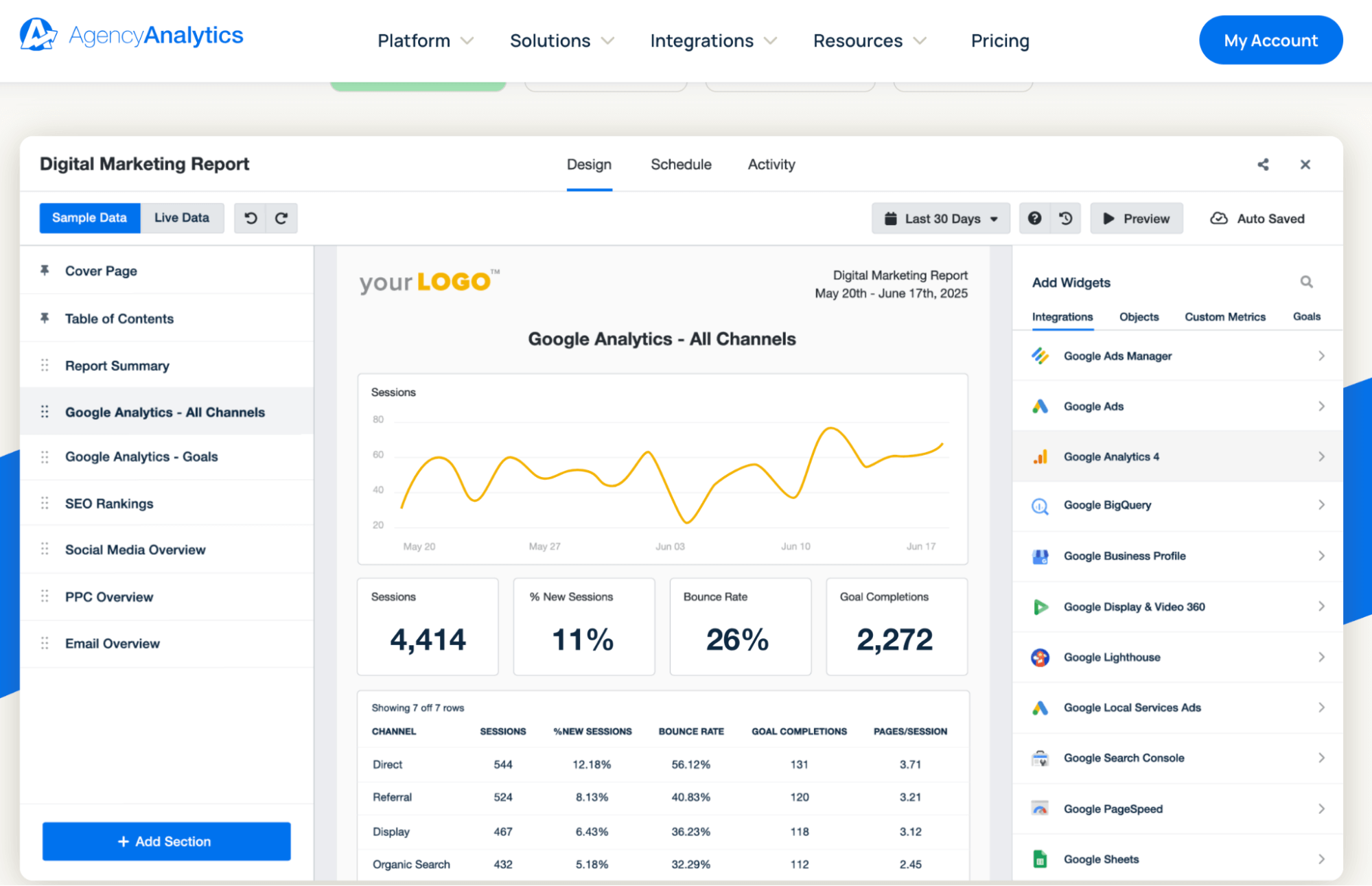
While excellent for reporting, AgencyAnalytics is not a deep SEO tool. It lacks comprehensive site auditing, advanced website monitoring, or detailed technical analysis. It’s best used as a client-facing reporting layer rather than a complete SEO management solution.
Key advantages and drawbacks
Pros:
✅ Strong focus on white-label dashboards and reports.
✅ 70+ integrations with SEO, PPC, and social platforms.
✅ Easy to use, client-friendly interface.
Cons:
❌ Limited technical SEO tools (no full site audit).
❌ No real-time website monitoring or alerts.
❌ Relies heavily on third-party integrations for data.
In summary, AgencyAnalytics is excellent for client reporting and dashboards but lacks the technical SEO depth agencies need to manage and optimize websites directly.
Conclusion
Choosing the right SEO management platform can dramatically improve how agencies handle reporting, communication, and project delivery. The best tools, from automation to white-label dashboards, help agencies scale faster and satisfy clients. Investing in a reliable solution will streamline daily workflows and strengthen SEO client health management, ensuring long-term retention and consistent growth.
